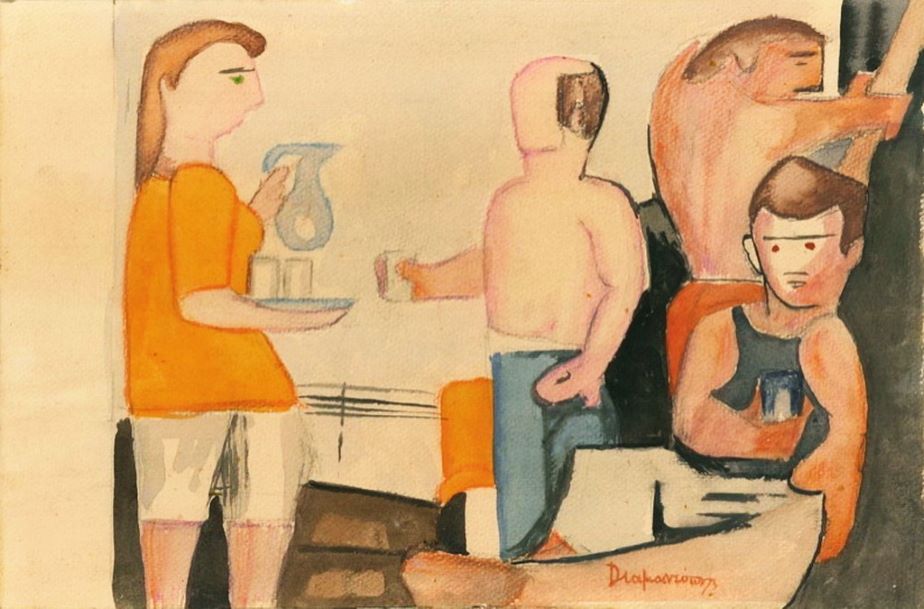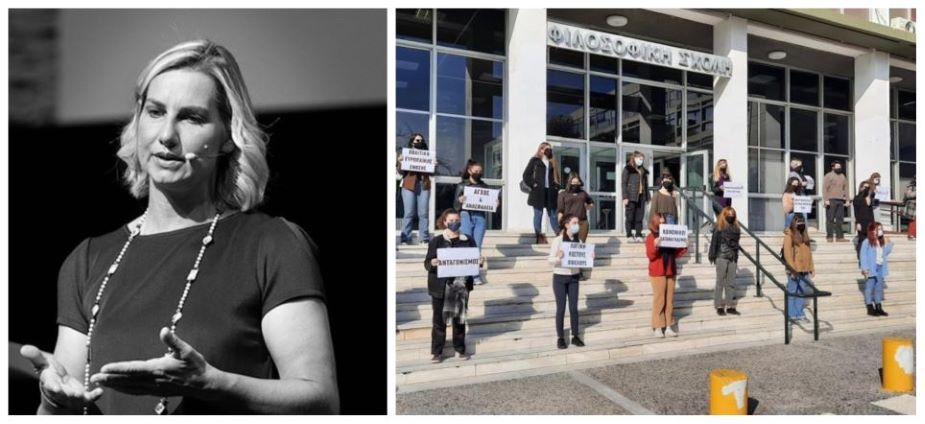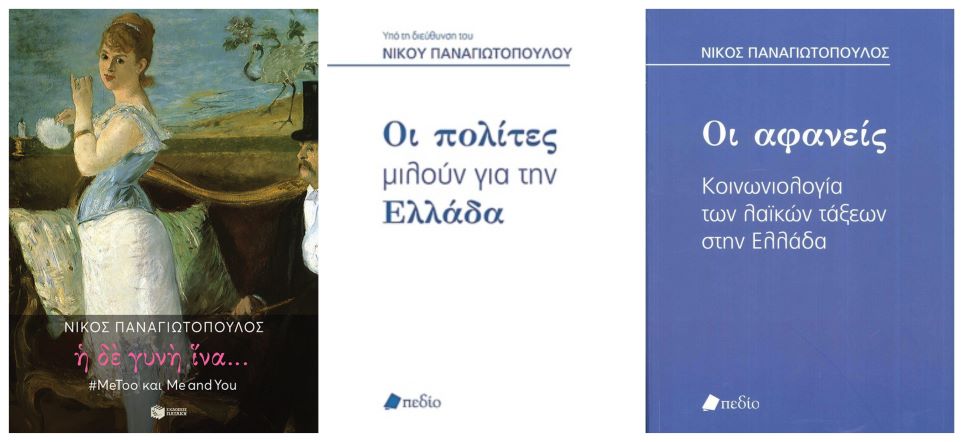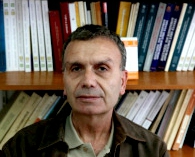Nikos Panayotopoulos is Professor of Sociology at the Department of Communication and Media Studies of the University of Athens. He is the director of the annual trilingual review of social research Κοινωνικές Επιστήμες (Social Sciences) and the Vice-President of the Bourdieu Foundation in Switzerland. He has been a student and collaborator of French sociologist Pierre Bourdieu, and has translated and edited many of his works in Greek. For his contribution in strengthening of the cultural ties between Greece and France, Panayotopoulos has received in 2019 the Order of the Knight of Letters and Arts. His most recent pupblications include “Τhe unseen.Sociology of the working classes in Greece” (in Greek, 2021), “Citizens talk about Greece” (in Greek, 2021), “And the woman shall… #metoo and me and you” (in Greek, 2021).
Professor Panayotopoulos spoke to Rethinking Greece* about the need for a new type of Agora that can politically engage citizens, the relevance of Bourdieu’s concept of symbolic violence, the #metoo movement in Greece and the need for strong policies to support gender equality, the transformations and ultimate decline of the working classes during the last century, and finally, the important function of sociology as a public science.
We often read, especially after the 2010 crisis, about the “compression of the middle class”. Has this compression also meant the expansion of the popular classes? How have the economic and cultural characteristics of the working classes changed in recent years in Greece?
Ι have examined how this very complex issue evolved over the period of the last 70 yeas or so. The transformations of the conditions of existence and the culture of the working classes stem from three fundamental tendencies: gradual social devaluation, disintegration and, finally, the strengthening of internal divisions. This long process was accelerated by the last great economic crisis that resulted in the current devaluation of the working classes, economically and socially, as well as politically and symbolically. The restructuring and retreat of entire sectors, among them industrial production, but also the spur of new technologies and new employer strategies, have led to the reduction of the number of working class jobs, the disappearance of traditional labour professions and the further devaluation of the relevant technical diplomas.
Mass unemployment, the expansion of precarious and flexible working arrangements, social insecurity (increasingly common), the impoverishment of many sections of the working classes, and, ultimately, the minimization of the importance of physical strength in working class jobs and of the masculine values around it, drastically affected the traditional identity of the woking classes. On the other hand, this economic devaluation of the working class world was intensified by a substantial political devaluation which was linked to the deconstruction of social democracy, as well as the decline of actuallly existing socialism and the ideology and forms of political messianism associated with it. The crisis of trade union and political representation and the symbolic disparagement of its representatives, as well as the decline of mobilization and resistance mechanisms of the working classes against increasing unemployment, led to the weakening of the collective work element that promoted working class interests.
At the same time, the economic and political devaluation of the woking classes, and of labour workers in particular, was also symbolic, as a result of mass education and the normalization of the entry of children of the working classes into compulsory education, and of the upper woking classes in higher education. This symbolic devalutation, especially of the traditional working classes was the result, on the one hand, of a process of ”downwards” deconstruction, via elastic-seasonal labor relations and unemployment; and on the other hand of a “upwards” decostruction via the search for social redemption through school success.
In short, this economic and symbolic devalution of the working classes has gradually weakened their internal cohesion and their identiy. Working class cohesion and identiy has also been challenged by the prevalence of terciary sector professions, activities and jobs, and the internalization of the criterion of economic success as a measure of social excellence. The opening of the working classes to the dominant culture, the deconstruction of the logic of the working class as an enclave and the devaluation of its traditional morality, furhter led to the formation and strengthening of internal differentiations within the working classes, such us those between the upper and the poorest sections, natives and immigrants, marginal workers-increasingly seasonal migrants and full time wokers, men and women, young and old.

As shown in your work “Citizens talk about Greece” many citizens feel left outside the public sphere and politics. Given that there is a global debate on the crisis of representation today, what structures could enhance the effective participation of citizens in modern democracies?
Today we are constantly talking about markets, everything is viewed in terms of the market. However, there is one type of market (agora) we don’t hear about very of often, the Marketplace of the People, what was called in ancient Greece, the Agora, meaning an assembly, a gathering place of the people –of course of a new type and form. So, we have to create such new public experiences. Publicly organized and institutionally established spaces where citizens, ordinary people will gather, and can, if they so wish, learn, become familiar with, converse and reflect on key issues and current problems; currently access to knowledge on important issues is very unevenly distributed. Spaces like that that will allow all citizens to form an informed opinion, which is an essential precondition for the exercise of citizenship rights. What is more, in order this to happen, a real personal transformation on the part of professional politicians is required, a complete redefinition of the social image their role. This will allow politicians to acquire the political imagination and ingenuity needed to effectively carry out their most fundamental task, which is non other than making the possible, feasible.
You have served as president of the Research Centre for Gender Equality and have recently published a book on #metoo in Greece. How do you assess the level of gender equality in Greece today? What changes could the Greek #metoo movement bring about?
There is certainly progress towards gender equality, but things have changed much less than we think. And the more we believe the opposite, the more conservative we become. We see this inequality almost every day; for example although women (we must always remember that women are not a uniform and socially undifferentiated group, but for the needs of the discussion let’s talk in a general way) are more educated now, it remains a common feature in couples with the same level of education that the husband has a better professional position. We can see it also in how conservative forces, such as the church, remain influential and immovable in issues such as birth control and same-sex marriage.
Does not the school, an institution that by definition promotes social transformations, continue to perpetuate, to a large extent, old structures and perceptions regarding gender relations? It may of course not explicitly tell girls not to choose Physic or Neurosurgery, but it does not challenge the pervasive social or familial perceptions of the role of women, and so we continue to see women flock to subjects like Litterature and Dentistry and Microbiology, for example. So we still have male and female professions and specialties. In short, these unconscious perceptions that ultimately pose obstacles to advancement of gender equality are being reproduced by socially conservative forces, whose modus operandi we tend to overlook.
Now, regarding what changes can be triggered by the Greek #metoo, I would say that the social conditions for such mobilizations have been ripe for a long time. Also, traditional as well as social media, due to their very nature amplify these social conditions as well as the mobilizations. With #metoo, I think an important precedent has been set in the history of women’s struggles for the defense of their autonomy and their self-determination against male domination. However, I believe that in order for there to be continuity, there must be a general awareness of what are the necessary initiatives and measures that will help abolish the conditions of reproduction of male domination, and of world that works to the detriment of women. It is time to stop being satisfied with good political intentions. These intentions must have continuity and consistency, and, above all, be characterized by substantial policies based on deep knowledge of the social world.

You have been a student and a close associate of the very important sociologist Pierre Bourdieu. What do you consider to be the most relevant element of Bourdieu’s thinking on understanding today’s globalized and digitized society?
If I had to choose I would say the concepts of symbolic violence and symbolic forms of domination, that is, all this important part of his work that examinines the ways in which the various forms of domination –be it economic, cultural or social– that make up the established social order are tolerated by those who have to endure them. The concept of symbolic violence proposed by Bourdieu is this special form of coercion which can only exist with the active – but not necessarily conscious or voluntary – complicity of those who suffer it. I consider this concept absolutely necessary in order to understand the many contemporary issues that concern us. I remind you that according to Pierre Bourdieu, social structures are funded on objectivity, on things,in the form of institutions, as well as on subjectivity, on the body and the mind in the form of systems of dispositions, attitudes and mental structures, of hexis as he called them.
The subjective cateogries of thought, perception, evaluation, action and sense through which we perceive the social world are themelves based of the objective structures of this same world, which allows for the self-evident nature of our everyday experience. On the basis of this premise, the phenomenon of domination and its legitimacy stems, according Bourdieu, from the conncetion between its objective definitions and its perceptions: as long as our congintive stuctures and the objective structures of domination are in angreement, and belief in this agreement is ensured, a faith-like submission to the established order is reproduced.
This “natural attitude” towards the world, this “belief in things”, this dogma, is an orthodoxy, a mainstream way of thinking, which is often imposed after struggles against competing views. The set of accepted ideas, established beliefs, deeply accepted, self-evident truths, is based on a pedagogical action (in the most general sense of the term) that is capable of transforming a position of prestige into legitimate power, exercising symbolic power to the extent that it imposes one system of values and rules instead of another.

What do you think is the mission and function of sociology today? You have said that you are interested in the role of the “public author”. What is the role of the sociologist as a public intellectual today?
I clearly attribute a political and medical function to sociology in the sense that it is, by its nature, an attempt to transform the gaze through which we construct the world and on the basis of which we can rationally and democratically shape human society, and, consequently, shape ourselves. For me, this mission of the sociologist is humble and, at the same time, of absolutely capital importance. The sociologist is neither a prophet nor an authority on critical thinking. He does not have the role of imparting lessons. We have experienced the bankruptcy of this role.
The sociologist’s public mission is to devise a new difficult role that, as Bourdieu said, will enable him to listen, research, invent, organize or coordinate the collective search for new forms of political action, new ways of mobilizing and working collectively, new ways of jointly elaborating and implementing plans. The sociologist should be able to play the role of midwife, reincorcing the potential of individuals and the groups they belong to, in their quest to express themselves and at the same time discover what they really are and what they could or should be. These and other functions that the sociologist can fulfill have, at the present time, increased chances of success. However, this fate of sociology as a public science that I defend, is closely linked to the degree of scientific development and to the degree of autonomy of the sociological field. Only an effective research policy, a Realpolitik of Reason can ensure the autonomy of the research field that will protect the funtion of sociology as a public science.
In any case, talking about the “public” character of a science, is I think worthwhile in itself, especially today, at a time when most people are talking about privatization. It is precisely this generalization of the culture of privatization that, seemingly paradoxically, generates the conditions for the formation of new types of audience that need public sociology as I defend it. To implement such a policy, much remains to be done, and at various institutional levels, especially today when sociologists, like most cultural producers, are increasingly deprived of both the means of production and the tools of disseminating and evaluating their work.
*Interview and translation Ioulia Livaditi















